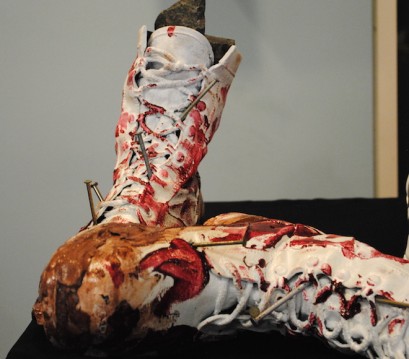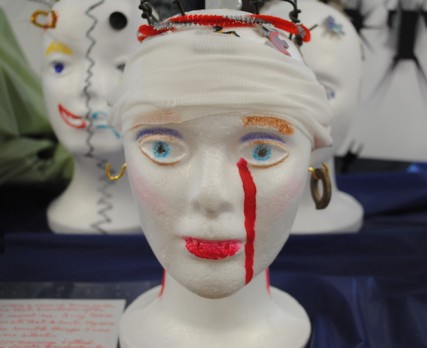
The grim reaper stands on the tip of the tiny left shoe. Behind him, a soldier emerges from the white laces, fixed above three protruding nails. On the left shoe: a heart broken in half, an eye crying blood.
With some markers and a blank canvas, Brenda Spry told her story. Childhood trauma followed her into the U.S. Air Force, where more wounds were waiting. For decades she tucked it away, tried to ignore it, and slowly let it win.
Then last year she went on a 5-day, 4-night retreat with other veterans, and she said something switched in her.
As she and her roommate, also a veteran, drove to the Warriors Heart to Art retreat at Immaculate Heart Retreat Center, Spry said she was talking herself out of attending. She was going to drop her roommate off and go. But she said when she walked through the door, the “energy was pure,” so she gave it a chance.
Spry, 68, went into the military right out of high school and served for 16 months during the Vietnam War until she got pregnant and was involuntarily discharged. She doesn’t like to talk about what happened during those 16 months.
“Back then women weren’t their deal,” she said.
Warriors Heart to Art uses visual arts, poetry and music to help veterans suffering from PTSD. Projects throughout the week are encouraged, but not required.
“It wasn’t about forcing you to do something. It was about giving us a voice and a choice,” Spry said.
She said for veterans, that’s huge.
Spry’s shoes were part of “Walk A Mile In My Shoes”, which were recently on display at the Museum of Arts and Culture. She chose not to participate in the “My Brain on PTSD” project, where attendees were given styrofoam heads to craft their story, explained Expressive Arts Therapist Lila Deilke, who volunteers for the program.
She said they also create a song together at the retreat that tells their collective story.
“Throughout the week they begin to open up and share with others. They’re up during the night talking and connecting and by the time they tell the story of their shoes, and tell the story of their head, they’re really telling their trauma, their deepest wounds, their shame and now they understand that they can open up that door to the trauma and it’s not going to overwhelm them,” Deilke said.
She said the past two retreats have drawn male and female veterans from various generations. Most of the women who attend, she said, suffer from sexual trauma.
At end of their time together, the veterans present their work at the Unitarian Universalist Church of Spokane, which the public is invited to.
Spry said that doing creative projects in a group with other veterans helped her realize she’s not alone in her struggle, and helped her to learn to trust again.

“When you’re in your own box you don’t think anyone really understands…but being in a group like that, and hearing other vets stories, you connect with that and it allows you to think you can express yourself and feel safe,” Spry said.
After the retreat ended she met regularly with the other women who had been at the retreat.
Warriors Heart to Art is inspired by the national Warrior Song project, which has been to Spokane. Warriors Heart is a way to keep the program local, so veterans can stay connected after the retreat ends, Deilke explained.
The women from last year’s program did that, and she hopes the men will do it in the future as well.
“They (the women) are becoming good friends and coming out of isolation,” she said. “They were very silent when they showed up and now we can’t get them to quit talking and it’s wonderful. They have lots to say, they’ve been holding back for so long.”
Spry recommends the retreat to other veterans, but said the timing has to be right.
“It was the right time for me,” she said. “I had been searching for an avenue. I didn’t want to keep holding onto this stuff that had controlled my whole life.”
Thomas Camel, of Montana, said the timing was right for him as well. He served in the Army from 1968-70 and said he knew there were more ways than talk therapy to heal.
“I was ready to go at it,” he said. “I was prepared to and opened myself up. It’s been a lifetime experience trying to heal, so I was ready.”
But he recognizes that not all veterans have that view. He said most veterans don’t want to talk about their experiences, particularly their war experiences, and many will die before they seek help.
Camel said if more veterans share their stories, more will be willing to get help and work through their PTSD.
He said the retreat helped him discover that his PTSD isn’t “all bad.”
“There’s some good in there somewhere, another way of looking at things,” he said. “It’s not just pure pain. It’s it’s also strength, beauty.”
Camel is part African American and part Native American. He said he experienced racial conflicts in the military, which he was able to express at the retreat.
Today he is exploring new ways to express his experiences — possibly through plays and drama.
Spry continues to keep in touch with the women from the group. Since the retreat she said she’s noticed she’s less reactive, more peaceful and doesn’t “feel attacked all the time.”
“I have a different level of understanding, which leads to more calmness,” she said.
She’s learned, she said, to take better care of her.
The next retreat will be Oct. 28-Nov. 1. Funded entirely by donations, the program is free for veterans. Space is limited. Register online or for more information call 518-878-8579 or email retreat@warriorshearttoart.org.







download de fotos do instagram ios
instagram android picture download online